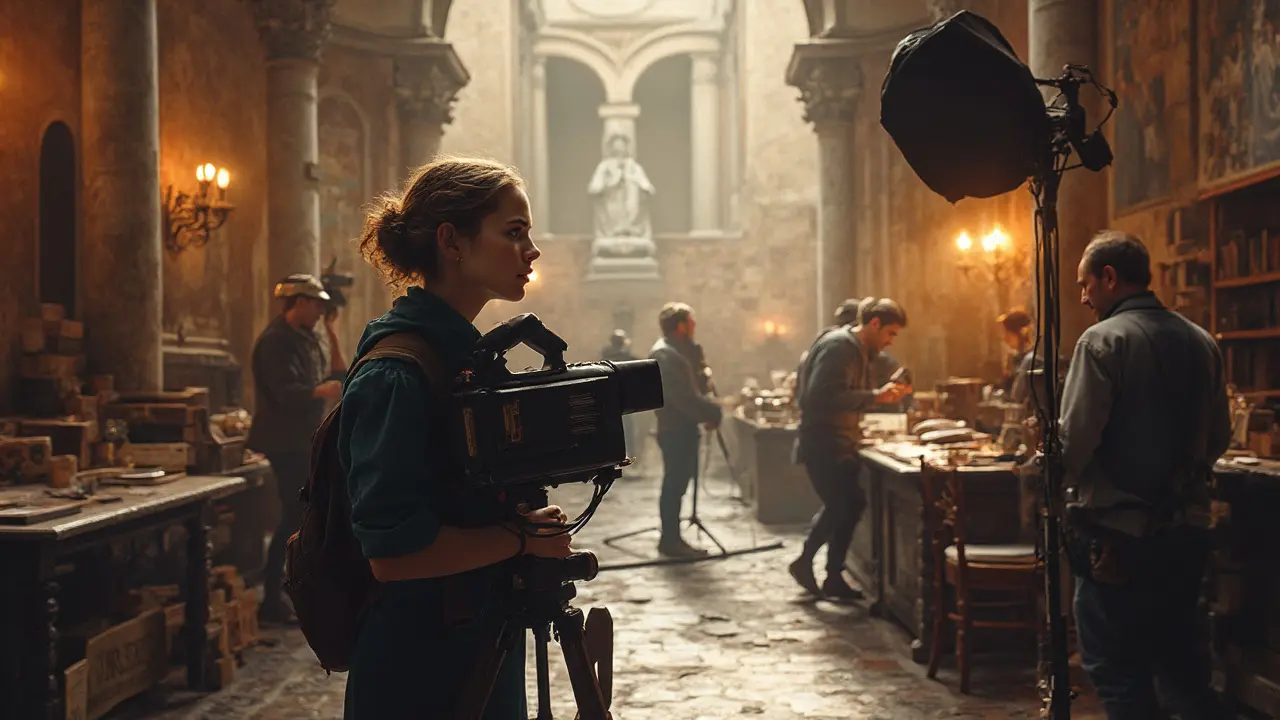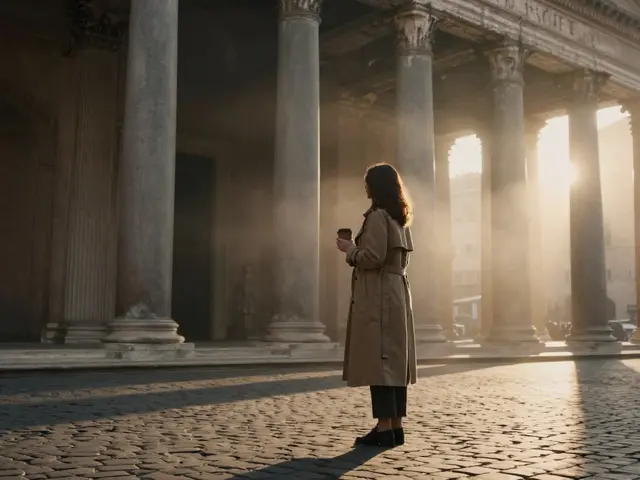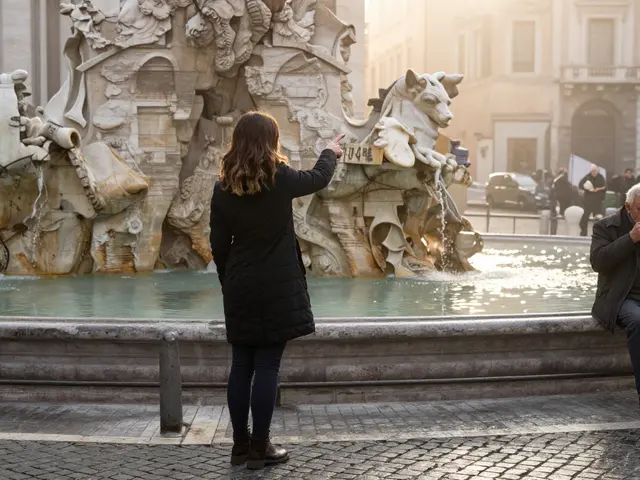Trying to break into movies in a different country sounds glamorous, right? Sara Bell found out Rome can be both exciting and unpredictable. The Italian film scene isn’t some museum—it's alive, filled with people hustling jobs, crews eating pasta on set, scripts changing at the last minute, and directors making decisions over espresso. For Sara, landing her first role was more about persistence than luck—she spent weeks perfecting Italian phrases and learning how local productions work.
If you're wondering what makes Rome such a magnet for film talent, part of it’s the city itself. But the real pull? The chance to be around experienced crews who know how to run a tight ship, even on tight budgets. Sara’s advice: don’t just focus on your acting; learn to adapt to how things are done in this wild, colorful industry. When she got her first call-back, she already knew to show up early, bring her own snacks (trust me, it matters), and network with everyone—even the lighting guy. That approach opened more doors than any fancy acting school ever could.
- Sara Bell’s First Steps in Rome
- Adapting to the Roman Film Industry
- Lessons from the Roman Film World
- Tips for Aspiring International Actors
Sara Bell’s First Steps in Rome
When Sara Bell landed in Rome, she was more nervous than she let on. Most people think acting is just about talent, but in the Roman cinema scene, connections and local know-how matter just as much. She spent her first few weeks juggling language lessons with last-minute auditions. Sara wasn’t fluent, but she made it work—she always had her lines down in both English and Italian, just in case. Her first agent, Paolo Giardini, once told an industry mag,
“Sara didn’t just show up—she showed up prepared. That’s rare, especially for newcomers.”
Her first gigs were small roles, including a one-line part in a historical drama filmed at Cinecittà Studios. Sara didn’t mind. Those short days on set taught her a ton: how to get noticed without overacting, how to handle Italian ADs barking orders, and why punctuality is a must—especially when every minute costs money.
She quickly picked up these rookie lessons:
- Always confirm your call time (and expect sudden changes).
- Carry your own snacks—catering can be hit-and-miss.
- Learn people’s names, especially behind the camera.
- If you mess up a line, keep rolling until the director calls cut.
- Shoes matter—cobblestone streets are real ankle-breakers.
Rome’s film industry is pretty competitive but not impossible to crack. For reference, check out this data from the Italian National Film Association on typical hurdles international actors face:
| Challenge | % of New International Actors |
|---|---|
| Language Barriers | 65% |
| Getting First Auditions | 49% |
| Bureaucratic Paperwork | 33% |
| Making Useful Industry Friends | 58% |
Sara chipped away at each one, asking questions even when she felt awkward. By the end of her first year, she’d managed to sign with an agency and book a steady stream of auditions—proof that starting with the basics might not be the flashiest move, but it gets real results.
Adapting to the Roman Film Industry
Sara Bell had to adjust fast when she stepped into the Roman cinema scene. If you’ve only worked on English-language sets, the Italian workflow is a real eye-opener. Films here often run on smaller budgets, so everybody pitches in, and even lead actors are expected to lend a hand off-camera, whether that means helping move lights or just grabbing gear. Sara learned early not to stand around waiting for instructions—initiative goes a long way in Rome.
One thing that stood out to Sara was how much Italians value relationships. Getting hired isn’t only about your audition, but who can vouch for you. Long coffee breaks are where much of the real talk happens. Sara started joining cast and crew during breaks instead of hiding away, and pretty soon, people remembered her name. She even picked up enough Roman slang to make folks laugh— and it broke the ice instantly.
On set, expect a different pace. Italian crews sometimes change plans on the fly, so Sara made a habit of double-checking call sheets each morning and always asking the assistant director if anything shifted. You can’t just assume stuff will be emailed ahead like on American sets; the daily briefing is king. Also, don’t be surprised if things run late—traffic in Rome can turn a studio into a parking lot in minutes.
- Learn basic Italian if you want to follow directions (Sara recommends Duolingo but says nothing beats talking to your driver or hair stylist).
- Never skip communal meals—deals are discussed over lasagna, seriously.
- Bring patience and flexibility to every set; a backup plan is your best friend.
- Network at film markets or even small festivals in the city—Sara landed her second film gig from a chat at a random rooftop party, not a cold audition call.
Adapting in Rome isn’t about changing who you are; it’s about blending into a tight-knit world where everyone pitches in and stories matter just as much as talent. Sara found that being open, showing up, and not being shy about small talk made all the difference.

Lessons from the Roman Film World
One thing Sara Bell learned fast: the Roman film world is about flexibility. Productions in Rome often run on their own clock—shooting start times can slide backward, and the script you rehearse in the morning might get tweaked by lunch. That’s not bad planning; it’s just how things go here, and the folks who succeed are the ones who roll with it.
When Sara worked with director Paolo Taviani, she realized that trust and loyalty mean as much as raw talent. Many Italian film crews stick together project after project, building almost a family vibe. Sara says, “If you help the team and bring a good attitude, people remember you.” So it’s not just about nailing your lines, but showing you’re reliable. Veteran lighting technician Carlo Meloni put it even simpler:
"In Rome, we hire people we like working with. Skills matter, but trust is everything."
Getting to know the pace of Italian films is key. While Hollywood may plan months ahead with strict call sheets, Roman sets often figure things out on the fly. Sara shared that days could stretch long—nobody blinks at 12 or even 14-hour shoots, and meals are never rushed. Cast and crew eat together, talking about scenes and life, and that’s often where creative sparks fly.
- Be ready to adapt: If plans change, just go with it. Flexibility leads to more work.
- Connect with the crew: Building relationships matters almost as much as delivering a great performance.
- Respect the local customs: In Rome, community and shared breaks are part of the job. Skipping out or being standoffish makes it tougher to fit in.
- Keep basics handled: Pack what you need for a long day—snacks, water, a phone charger—since shoot days are unpredictable.
Sara’s final takeaway? The Roman cinema world runs on trust, teamwork, and a can-do attitude. If you’re the type who needs everything mapped out ahead of time, you might struggle at first. But if you embrace the unexpected, you’ll not just survive—you’ll probably get invited back for more.
Tips for Aspiring International Actors
If you’re thinking about jumping into the Roman cinema scene, it helps to know what you’re really walking into. Sara Bell kept a running list of things she wished she’d known before stepping behind the camera in Rome, and a lot of it comes down to the small stuff most people miss.
- Language isn’t optional. Even if you speak English, directors and crews in Rome usually default to Italian. Sara spent her first three months practicing Italian every day, watching Rai movies, and even hiring a local tutor online. Flashy apps are fine, but nothing beats real conversations for picking up the slang and set vocabulary.
- Build relationships before you look for roles. Networking isn’t about red-carpet parties; it’s grabbing coffee with production assistants and chatting with makeup artists between takes. Sara landed her second role not because she wowed at auditions, but because she kept in touch with a costume designer from her first set.
- Do your paperwork early. If you’re not an EU citizen, work permits and visa stuff come first. Sara admits she almost missed a contract because her documents were lost in translation at the post office. Check film unions like Anica for requirements and ask other foreign actors for real-world tips on getting sorted fast.
- Learn the culture of the set. Roman film sets run pretty differently than UK or US productions. Crews take long lunch breaks (“pasta hour” is legit), and schedules are flexible. Expect last-minute changes and stay calm—Sara credits her success to being able to roll with chaos.
- Get used to small budgets. Italian productions, unless you’re shooting with a big name director, run lean. Sara kept a spare phone charger and snacks in her bag because nobody’s pampering you with a fancy trailer. Show you can handle rougher conditions and you’ll get called back.
Here’s a quick look at some data Sara and other expats share about the Roman movie industry. Numbers help keep your expectations real:
| Fact | Typical in Rome | UK/US Average |
|---|---|---|
| Minor Role Pay (per week) | €600 | £1,200 / $1,500 |
| Average Film Shoot | 8 weeks | 12-16 weeks |
| Auditions Per Year (foreigners) | 8-12 | 15-20 |
| Actors with Day Jobs | About 70% | About 50% |
Truth is, most international actors in Rome make their living from a mix of small acting gigs, commercial work, and regular jobs. Sara did voiceover gigs and even a couple of teaching jobs her first two years. If you’ve got hustle and patience, the experience pays off—not always in cash, but definitely in the stories you’ll have for years.







